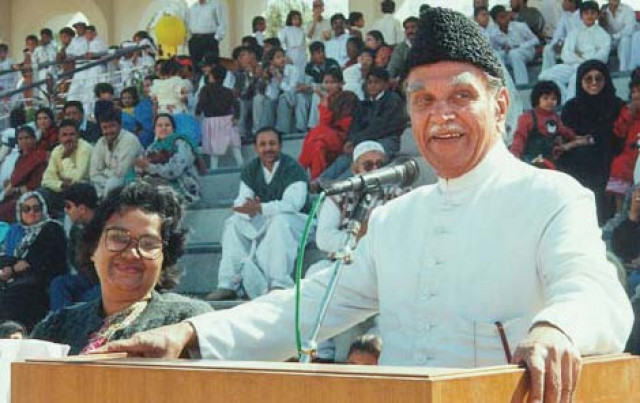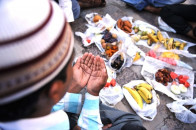Medicine man, Hakeem Said’s 12th death anniversary today
Hakeem Said is the name behind Hamdard Dawakhana, Hamdard University, Madinat-al Hikmah among other things.

Hakeem Said, a former governor of Sindh, a Tibbi physician, scholar and the author of over 200 books, was gunned down on October 17 in 1998 on Arambagh Road after leaving his matab or clinic after Fajr prayers. His killing precipitated the end of the coalition government of the Muttahida Qaumi Movement (MQM) and the Pakistan Muslim League as activists of the former party were implicated in the murder case. Governor Rule was imposed in Sindh and its government came directly under federal rule.
“The Sindh High Court acquitted all nine men accused in the case which is in the Supreme Court,” said Syed Rehman Ali, who is the deputy director of information with Hamdard Laboratories. “We cannot comment on it because the government itself is a complainant in the case.”
During the investigation, the police raided a house in Scout Colony and arrested Fasih alias Jugnu. Jugnu was tortured to death in police custody and a case was registered against the police who said it was “suicide”. His case is still in pending with the Additional Sessions Judge South.
A year after Hakeem Said’s killing, an anti-terrorism court sentenced the men to death but in 2001, the Sindh High Court acquitted them on the grounds that the prosecution had failed to provide any evidence. Since then, the case has been in the Supreme Court. Fastforward 11 years. The former director of the Intelligence Bureau, Colonel Iqbal Niazi, confesses in a television programme in June 2010 that the MQM was not involved in the murder. According to him, he had communicated this to the higher authorities but no one had listened to him.
Medicine man
Hakeem Said, who was born in Dehli in January 1920, migrated to Pakistan in 1948. He received Hikmat or the gift of healing from his ancestors and possessed an extraordinary intellect and a phenomenal memory. Testament to this is the fact that he completed a Nazira reading of the Holy Quran when he was six years old and had memorized it to become a Hafiz when he was just nine years old.
He set up his clinic in Karachi in 1984 and started making herbal medicines and the Hamdard Dawakhana was inaugurated on June 19, 1948. This was the beginning of Hamdard in Pakistan and in 1953, it gained the status of a full-fledged pharmaceutical industry.
“Hakeem saheb would sit at his matab after Fajar prayers every Saturday and Sunday and would stay at the clinic until he saw the last patient,” recalls Syed Muhammad Yaqoob of Idara-e-Said. “He never charged any patient whether they were rich or poor and he would fast when he was holding clinic.” He never changed this schedule and according to a senior staffer, who spent his whole life by his side, Hakeem Said kept his clinic open even when he was governor in 1993 and a federal minister in 1982.
Writings
Aside from a medical practitioner, Hakeem Said was a prolific writer. “He would take out his pen and paper as soon as he settled down in a plane and kept writing even in the transit lounge,” recalls Syed Muhammad Yaqoob. In fact, most of his travelogues were written while he was on a journey.
According to a biography of the man, medicine was not necessarily what Hakeem Said had wanted to do in life. He had wanted to be journalist and had been inspired by the writings of Maulana Muhammad Ali Jauhar and Maulana Abul Kalam Azad. But his elder brother had wanted him to study Tibb. As if to make up for this passion on the side, Hakeem saheb authored around 200 books, including 35 in English on Islam, Pakistan, medicine, health and science. Eight of his books are on children, there are 12 travelogues, 50 books in Urdu for Naunehal and 45 books in Urdu for young people and travelogues for children.
Among other awards, Hakeem saheb was awarded the Nishana-e-Imtiaz (the highest civilian award in Pakistan), the Sitara-e-Imtiaz, the Islamic Medicine Award and the Science and Technology Award as well. His daughter Sadia Rashid runs the Hamdard Foundation and Hamdard (Waqf) Laboratories today.
Published in The Express Tribune, October 17th, 2010.



















COMMENTS
Comments are moderated and generally will be posted if they are on-topic and not abusive.
For more information, please see our Comments FAQ